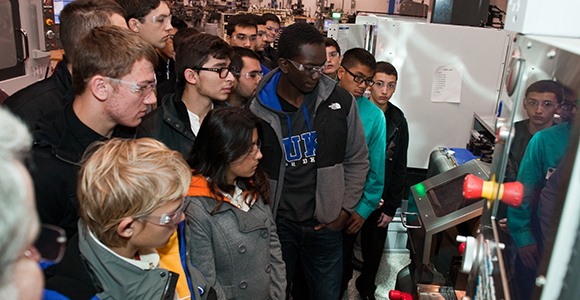
(Photo Credit: CODNewsroom/Flickr)
In our work across the state, we hear community college students saying, “I need an opportunity, not just a college.”
Community college students face a wide array of issues and difficulties that can prevent them from completing their education. Many work full time in low-paying jobs. Many are first-generation college students and don’t have family members to lean on for support and advice. Some come from low-income families and haven’t been far beyond their immediate communities, nor do they know about the types of jobs or opportunities that are out there.
Community colleges, when working together, have a unique ability to overcome barriers and create opportunities. They can join forces to help straighten the education pathway and increase students’ chances of completing a first-rate education with work-ready skills that employers need.
Students are hungry for a more concrete direction in their career path. We heard from one student that they see career technical education (CTE) programs as a chance to build skills that will give them an edge in their careers. This student also expressed a strong belief that community colleges are the training ground for the workforce California needs to compete for business here on our shores and overseas in global markets. Any investment the state makes in community colleges is a smart investment in employees with transferable skills that directly benefit California businesses. For him, if California is going to attract business and succeed economically, it has to have a workforce with the skills to fill 21st century jobs.
The Strong Workforce program, the governor’s proposed $200 million in support of CTE, has the goal of increasing the number of Californians with industry-valued, middle-skills degrees, certificates and credentials that lead to living-wage jobs.
The Strong Workforce program advocates for colleges and the industries they serve to join forces and operate on a regional basis, and we agree. We see regionalism as an integral component for delivering opportunities, not just a college. We believe, as Aristotle did, that the whole is greater than the sum of its parts.
Regionalism makes specialized education more accessible. Because not all programs are available at all schools, some students may need to take core training from their nearby college and then specialized training from a neighboring college. With colleges working in concert, their courses can articulate with each other and result in the same degree, credential or certificate. With the geographic flexibility it offers, this notion of “curricular portability” can greatly increase students’ chances of access to education and subsequent completion.
Regionalism produces stronger skills for students to take to the workforce. When colleges work together, the result is each being inherently stronger and having a greater capacity to deliver current and more robust skills to their students and local companies. They can share best practices in curriculum and professional development, conduct joint marketing and labor market research, leverage existing facilities and equipment, and braid funding resources to gain economies of scale.
Regionalism among colleges, when combined with strong industry partnerships, makes an unbeatable team for delivering work-ready skills to students. Regional employers can tell colleges exactly the skills they need now and in the future and help design curriculum that is shared among campuses. Colleges and industry can collaborate on internships and Registered Apprenticeships, helping students gain practical skills and work experience. When initiatives like these are conducted on a larger, regional basis as opposed to within a single community college, students gain greater access to skills and employers, and employers gain greater access to a wider pool of potential employees. It’s a win-win.
We urge the California legislature to support the governor’s Strong Workforce program, which will better enable California Community Colleges to deliver opportunities and success to its students.
Linda Wah is a trustee of Pasadena City College and member of the California Community Colleges Board of Governors Strong Workforce Task Force. Gustavo Herrera is the west coast director of Young Invincibles, an organization that represents the interests of 18-34 year-olds across the country. Both are members of the Strong Workforce Implementation Advisory Team.

